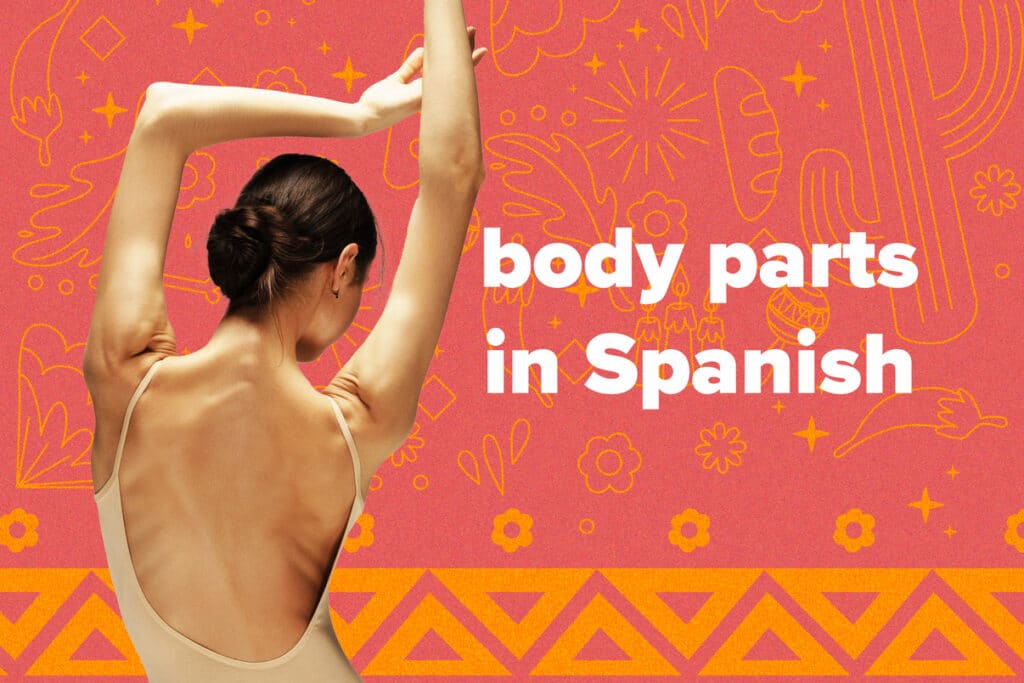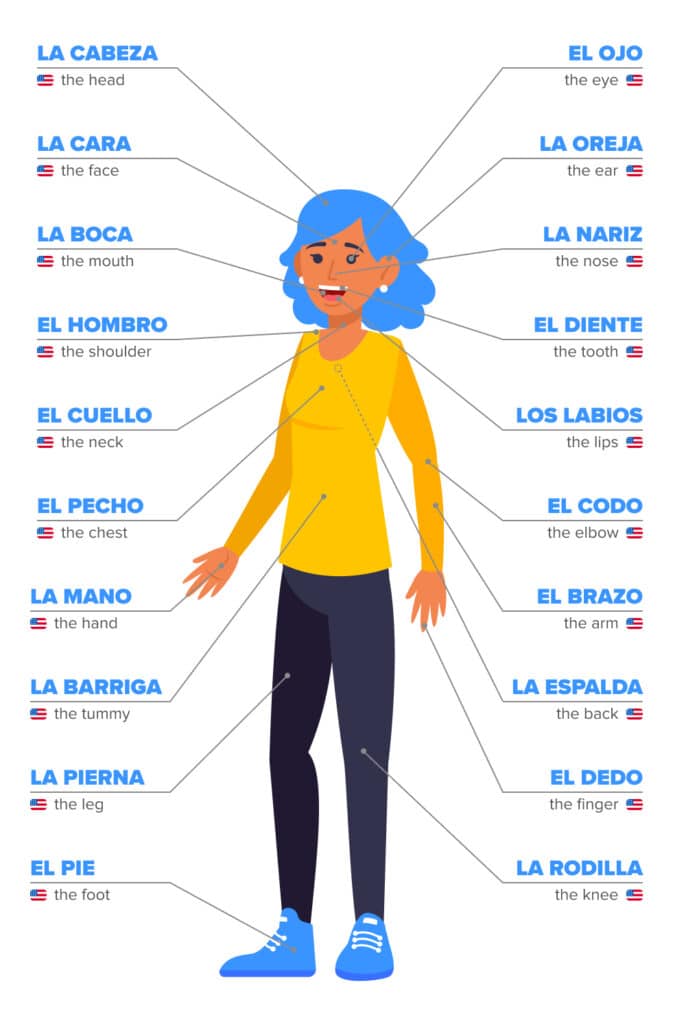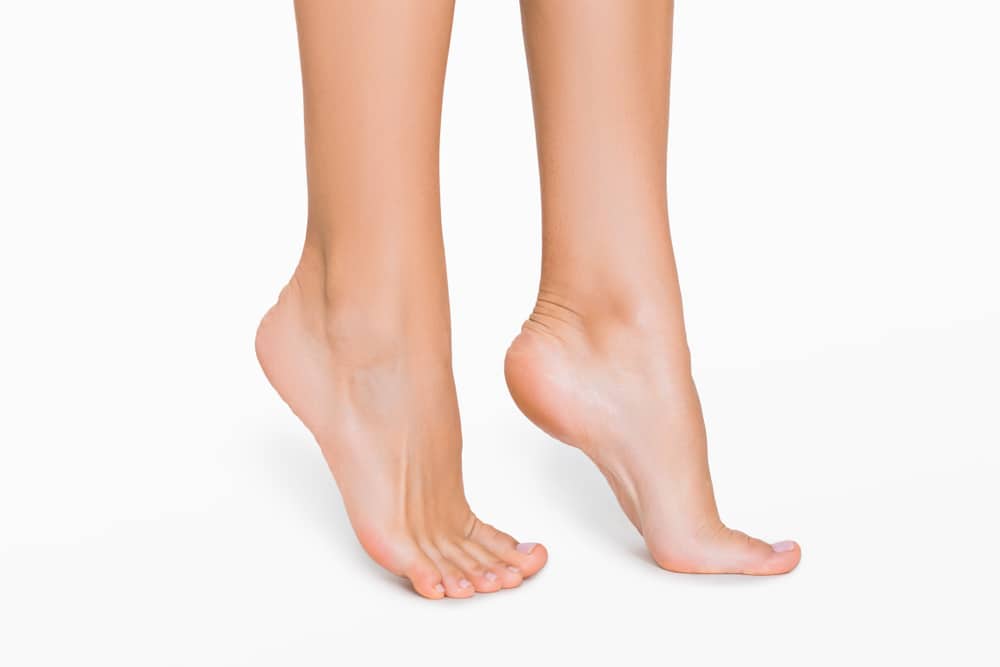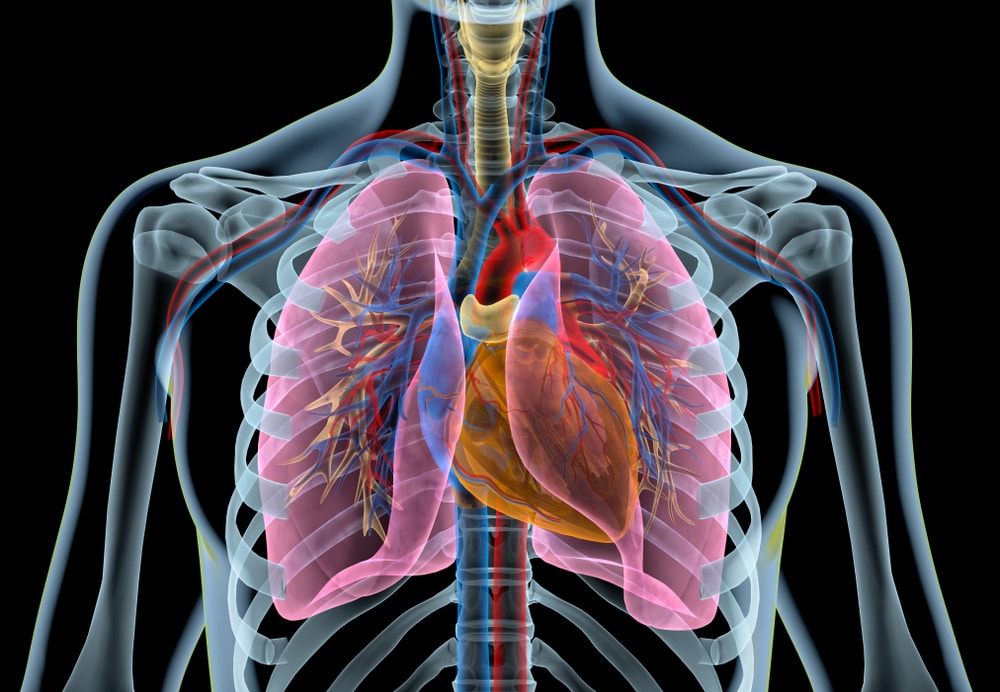
Body Parts in Spanish: 74 Essential Words (Plus Must-know Idioms and Expressions)
Knowing how to say body parts in Spanish is more valuable than you can imagine.
I’ve lived abroad long enough to know that these everyday words are beneficial at the gym, when you need to visit the doctor and more.
In this post, I share a complete Spanish body parts vocabulary list with 74 key words. You’ll also find a variety of idiomatic expressions with body parts, along with some simple grammar rules for speaking about your body in Spanish.
Contents
- Spanish Body Part Vocabulary
- Talking About Grooming in Spanish
- Useful Phrases and Expressions with Body Parts in Spanish
- Grammar for Speaking About the Body in Spanish
- And One More Thing…
Download: This blog post is available as a convenient and portable PDF that you can take anywhere. Click here to get a copy. (Download)
Spanish Body Part Vocabulary
From the Neck Up in Spanish
Let’s get a head start with the body parts from the neck up that you need to know in Spanish.
You’ll notice that for all body parts listed in this blog post, there’s a definite article (el/la or los/las) in front of each. When talking about your body, you should always use the definite article.
| Spanish | English |
|---|---|
| El cuello | The neck |
| La cabeza | The head |
| La cara / el rostro | The face |
| El pelo / el cabello | The hair |
| El cuero cabelludo | The scalp |
| La frente | The forehead |
| La oreja | The (outer) ear |
| El oído | The (inner) ear |
| El ojo | The eye |
| La nariz | The nose |
| La boca | The mouth |
| Los labios | The lips |
| La mejilla | The cheek |
| La barbilla | The chin |
| Las cejas | The eyebrows |
| El párpado | The eyelid |
| Las pestañas | The eyelashes |
| El bigote | The mustache |
| La barba | The beard |
From the Shoulders to the Navel in Spanish
So far so good? Great! Now we’re going to the (literal) core—the shoulders to the navel.
Though most of the words listed above and below are singular, you can follow the rules for plurals in Spanish to talk about pairs (i.e. los ojos, las muñecas, etc).
| Spanish | English |
|---|---|
| El hombro | The shoulder |
| El pecho | The chest |
| La espalda | The back |
| El brazo | The arm |
| El codo | The elbow |
| La mano | The hand |
| La muñeca | The wrist |
| La palma | The palm |
| El dedo | The finger |
| El pulgar | The thumb |
| El dedo índice | The index finger |
| El dedo corazón / el dedo de en medio | The middle finger |
| El dedo anular | The ring finger |
| El meñique | The pinky |
| La uña | The nail |
| El seno | The breast |
| El pezón | The nipple |
| La axila | The armpit |
| La barriga | The belly |
| La cintura | The waist |
| El ombligo | The belly button |
From the Hips to the Toes in Spanish
In the table below, you’ll find more Spanish body parts, from the hips right down to the toes.
| Spanish | English |
|---|---|
| Las caderas | The hips |
| El trasero | The buttocks |
| Los genitales | The genitals |
| El muslo | The thigh |
| La rodilla | The knee |
| La pierna | The leg |
| La pantorrilla | The calf |
| El tobillo | The ankle |
| El pie | The foot |
| El talón | The heel |
| El dedo del pie | The toe |
| La uña del dedo del pie | The toenail |
Whenever I visit a Spanish-speaking country, it’s fun to hear people use different words than I’m used to for some body parts.
For instance, el trasero—the butt—can be called las pompis or las nalgas depending on the country.
This is important to keep in mind as you continue working through these lists. These are the standard words, but different dialects can have their own specific terms that are more common in that country.
For this reason, I like to use an immersion program like FluentU.
FluentU takes authentic videos—like music videos, movie trailers, news and inspiring talks—and turns them into personalized language learning lessons.
You can try FluentU for free for 2 weeks. Check out the website or download the iOS app or Android app.
P.S. Click here to take advantage of our current sale! (Expires at the end of this month)

Beneath the Skin in Spanish
Whether you want to express how much you love someone or something with all of your corazón (heart) or you need to talk about a painful músculo (muscle), the words listed below will be useful for many situations.
| Spanish | English |
|---|---|
| La piel | The skin |
| Los poros | The pores |
| El cerebro | The brain |
| La lengua | The tongue |
| El diente | The tooth |
| Las encías | The gums |
| La mandíbula | The jaw |
| La garganta | The throat |
| El corazón | The heart |
| El pulmón | The lung |
| El estómago | The stomach |
| El hígado | The liver |
| Los intestinos | The intestines |
| El riñón | The kidney |
| El abdomen | The abdomen |
| El vientre | The womb |
| La vejiga | The bladder |
| El músculo | The muscle |
| La vena | The vein |
| El hueso | The bone |
| La sangre | The blood |
| El cuerpo | The body |
Talking About Grooming in Spanish
Check out these useful verbs in Spanish when dealing with grooming and your appearance.
| Spanish | English |
|---|---|
| Lavarse | To wash |
| Cortarse | To cut/trim |
| Hacerse | To get done |
| Rasurarse / Afeitarse | To shave |
| Cepillarse | To brush (e.g., hair and teeth) |
| Peinarse | To brush/do your hair |
| Pintarse / Teñirse | To color/dye/tint |
Useful Phrases and Expressions with Body Parts in Spanish
Did you know that parts of the body are also used in other contexts in Spanish?
Here are some common everyday phrases you may encounter:
| Spanish | English |
|---|---|
| Un diente de ajo | A garlic clove (Lit. A tooth of garlic) |
| Una cabeza de lechuga / Una cabeza de ajo | A head of lettuce/A head of garlic |
| Una mano de guineo / Una mano de banano | A bunch of bananas (Lit. A hand of banana) |
| El ombligo de la semana | The middle of the week (Lit. The belly button of the week) |
| Una persona coda | A cheap person (Lit. An elbow person) |
There are also plenty of idiomatic expressions that use body part words:
| Spanish | English | Example sentence |
|---|---|---|
| Tener buen diente | To be a big eater. (Lit. To have a good tooth.) | Desde niño, siempre ha tenido buen diente.
(Ever since he was a child, he's always been a big eater.) |
| Ser el cerebro detrás de | To be the brains behind. | Mi amigo es el cerebro detrás del proyecto.
(My friend is the brains behind the project.) |
| Venir de sangre azul | To be from an aristocratic family. (Lit. To come from blue blood.) | Su marido viene de sangre azul.
(Her husband comes from an aristocratic family.) |
| Estar hasta las narices / Tener a alguien hasta las narices | To be fed up. (Lit. To be up to the noses / To have somebody up to the noses.) | ¡Cállate! ¡Me tienes hasta las narices!
(Shut up! I am fed up!) |
| Dar en la nariz | To suspect. (Lit. To give in the nose.) | Me da en la nariz que es culpable.
(I suspect he is guilty.) |
| Poner los ojos en blanco | To roll one’s eyes. (Lit. To put one’s eyes in white.) | Puso los ojos en blanco y se fue.
(She rolled her eyes and left.) |
| No pegar ojo | To not sleep a wink. (Lit. Not to paste an eye.) | No he pegado ojo en toda la noche.
(I haven't slept a wink all night.) |
| Hacerse la boca agua | To make the mouth water, to make one's mouth water. | Con el olor a pastel se me está haciendo la boca agua.
(The smell of cake is making my mouth water.) |
| Levantarse con mal pie | To wake up on the wrong side of the bed. (Lit. To wake up with bad foot.) | Hoy todo te molesta. ¿Te has levantado con mal pie, o qué?
(Everything bothers you today. Have you woken up on the wrong side of the bed, or what?) |
| Estar con el agua al cuello | To be up to one's neck. (Lit. To be with the water at the neck.) | Lo ha perdido todo y está con el agua al cuello.
(He has lost everything and is up to his neck.) |
| Hablar por los codos | To talk a lot. (Lit. To speak from the elbows.) | ¡El problema es que hablas por los codos!
(The problem is that you speak a lot!) |
| Echar una mano a alguien | To lend a hand to someone. (Lit. To throw a hand to someone.) | ¿Podrías echarme una mano? No entiendo las instrucciones.
(Could you lend me a hand? I don't understand the instructions.) |
| Poner al mal tiempo buena cara | To put on a happy face. (Lit. To put a good face to bad weather.) | Sé que a veces es difícil, pero recuerda poner al mal tiempo buena cara.
(I know it's difficult sometimes, but remember to put on a happy face.) |
| No dar pie con bola | To be unable to do anything right. (Lit. Not to give foot with ball.) | Hoy no doy pie con bola. He tirado el yogurt con la cuchara dentro...
(I can't do anything right today. I have thrown away the yogurt with the spoon inside...) |
| Estar metido hasta la cabeza en algo | To be fully involved. (Lit. To be inside up to the head in something.) | Estamos metidos hasta la cabeza en el proyecto.
(We are fully involved in the project.) |
| Ponérsele los pelos de punta a alguien | To be very scared. (Lit. To make one's hair stand on end.) | Se me ponen los pelos de punta cada vez que veo una araña.
(I get very scared every time I see a spider.) |
| Tener mucha cara | To be shameless. (Lit. To have a lot of face.) | Mario tiene mucha cara. Ha venido sin invitación.
(Mario is shameless. He has come without an invitation.) |
| Andarse con mil ojos | To be very careful. (Lit. To walk with a thousand eyes.) | Ándate con mil ojos si vuelves a casa tarde.
(Be very careful if you come back home late.) |
| No tener pelos en la lengua | To not mince words. (Lit. Not to have hairs in the tongue.) | Mi hermana no tiene pelos en la lengua. Siempre dice lo que piensa.
(My sister doesn't mince words. She always says what she thinks.) |
| Echar en cara | To throw something in someone's face. (Lit. To throw in face.) | Siempre nos echa en cara lo que pasó.
(He always throws what happened in our faces.) |
| No tener dos dedos de frente | To not be very smart. (Lit. Not to have two fingers of forehead.) | Ese hombre no tiene dos dedos de frente. ¡Está conduciendo borracho!
(That man is not very smart. He is driving while under the influence of alcohol!) |
| Tener la mosca detrás de la oreja | To be suspicious, to smell a rat. (Lit. To have the fly behind the ear.) | Desde que su novio le fue infiel, siempre tiene la mosca detrás de la oreja.
(Ever since her boyfriend was unfaithful to her, she is always being suspicious.) |
| Tomarle el pelo a alguien | To pull someone's leg. (Lit. To take someone's hair.) | ¡Dejad de tomarme el pelo y decidme qué está pasando!
(Stop pulling my leg and tell me what's going on!) |
| No dar alguien su brazo a torcer | To not give in. (Lit. Not to let one's arm be twisted.) | No me importa lo bonito que sea. Es muy caro y no daré mi brazo a torcer.
(It doesn't matter how beautiful it is. It is very expensive, so I am not giving in.) |
| Salir por piernas | To rush out of a place. (Lit. To go out by legs.) | En cuanto vi al perro salí por piernas.
(I rushed out the moment I saw the dog.) |
| Cruzarse de brazos | To fold one's arms, to stubbornly resist something, to be closed off. (Lit. To cross oneself of arms.) | No me gusta la gente que se cruza de brazos y no echa una mano.
(I don't like people who just fold their arms and don't lend a hand.) |
| Dormir a pierna suelta | To sleep soundly. (Lit. To sleep at loose leg.) | Anoche dormí a pierna suelta toda la noche.
(I slept soundly all night last night.) |
| Estar para chuparse los dedos | To be delicious. (Lit. To be to lick one's fingers.) | Este pollo está para chuparse los dedos.
(This chicken is simply delicious.) |
| Poner el dedo en la llaga | To rub salt into the wound. (Lit. To put the finger in the sore.) | Tus palabras le están poniendo el dedo en la llaga al pobre Juan.
(Your words are just rubbing salt into poor Juan's wound.) |
| Metérsele a alguien hacer algo entre ceja y ceja | To get it into one's head to do something. (Lit. To put somebody to do something between eyebrow and eyebrow.) | A Lorena se le ha metido entre ceja y ceja ponerse el vestido rojo.
(Lorena has gotten it into her head to put on the red dress.) |
| Costar un ojo de la cara | To be very expensive. (Lit. To cost an eye of the face.) | Su nuevo reloj le ha costado un ojo de la cara.
(His new watch is very expensive.) |
| Arrimar el hombro | To help. (Lit. To bring the shoulder closer.) | Todos tenemos que arrimar el hombro si queremos terminar a tiempo.
(We all need to help if we want to finish on time.) |
| Ser todo oídos | To be very interested. (Lit. To be all ears.) | Cuéntamelo todo. ¡Soy todo oídos!
(Tell me everything. I'm all ears!) |
| Nacer con un pan bajo el brazo | To be born with a silver spoon in your mouth, to bring good fortune to your family. (Lit. To be born with a piece of bread under the arm.) | Antonio nació con un pan bajo el brazo. Su padre es el hombre más rico de la ciudad.
(Antonio was born with a silver spoon in his mouth. His father is the richest man in the city.) |
| Tener agallas | To be brave enough to do something. (Lit. To have the guts.) | Finalmente tuve agallas para decirle la verdad.
(I finally had the guts to tell her the truth.) |
| Morderse la lengua | To not to say a word. (Lit. To bite one's tongue.) | Mejor muérdete la lengua y no empeores las cosas.
(Better don't say a word and don't make things worse.) |
| Tener sangre fría | To be cold-blooded. (Lit. To have cold blood.) | El asesino tiene sangre fría.
(The killer is cold-blooded.) |
| Tener la sangre fría * | To have a cool head. (Lit. To have cold blood.) | Ellos tienen la sangre fría al tomar decisiones.
(They have a cool head when making decisions.) |
| A sangre fría | In cold blood. (Lit. At cold blood.) | Mi vecino fue asesinado a sangre fría la semana pasada.
(My neighbor was murdered in cold blood last week.) |
| A ojo de buen cubero | Approximately. (Lit. At a good barrel-maker's eye.) | A ojo de buen cubero debe haber unas mil personas aquí.
(There are approximately one thousand people here.) |
| Comerse a alguien con los ojos | To stare at someone, usually feeling attraction. (Lit. To eat someone with the eyes.) | Matthew se está comiendo con los ojos a esa chica.
(Matthew is drooling over that girl.) |
| En un abrir y cerrar de ojos | In the blink of an eye. (Lit. In an opening and closing of the eyes.) | Eso puedo hacerlo en un abrir y cerrar de ojos.
(I can do that in the blink of an eye.) |
| Regalarle el oído a alguien | To flatter someone. (Lit. To gift the ear to someone.) | Deja de regalarme el oído. No quiero salir contigo.
(Stop flattering me. I don't want to go out with you.) |
| Hacer oídos sordos | To make ears deaf. (Lit. To turn a deaf ear.) | Hizo oídos sordos a mis advertencias y siguió conduciendo rápido.
(He turned a deaf ear to my warnings and kept on driving fast.) |
| No tener ni pies ni cabeza | To make no sense at all. (Lit. To not have neither feet nor head.) | Lo que dices no tiene ni pies ni cabeza. ¡Es imposible!
(What you say makes no sense at all. It is impossible!) |
| Ser el ombligo del mundo | To be the center of the world (universe). (Lit. To be the belly button of the world.) | Se cree que es el ombligo del mundo y en realidad es un don nadie.
(He thinks he is the center of the universe but he is just a John Doe.) |
| Ser uña y carne | To be inseparable. (Lit. To be nail and flesh.) | Son uña y carne. Van juntos a todos sitios.
(They are inseparable. They go everywhere together.) |
| Dar la espalda a alguien | To give the cold shoulder. (Lit. To give the back to someone.) | Mis amigos me dieron la espalda cuando descubrieron que estaba embarazada.
(My friends gave me the cold shoulder when they found out I was pregnant.) |
| Llegar a las manos | To come to blows. (Lit. To arrive to the hands.) | Al final llegaron a las manos y tuvo que venir la policía.
(In the end they came to blows and the police had to come.) |
| Hincar los codos | To study hard. (Lit. To stick one's elbows.) | Bruno ha estado hincando los codos para su examen de español.
(Bruno has been studying hard for his Spanish exam.) |
| Tener la cabeza dura | To be stubborn. (Lit. To have a hard head.) | Kelly tiene la cabeza muy dura y siempre hace lo que quiere.
(Kelly is very stubborn and she always does what she wants.) |
| Tener mucha mano izquierda | To be very diplomatic. (Lit. To have a lot of left hand.) | Tienes que tener mano izquierda en este mundo si quieres sobrevivir.
(You have to be very diplomatic in this world if you want to survive.) |
*While this expression is almost identical to the one listed above, note the use of the article la. This isn’t compulsory, but the article is more commonly used when the expression is used to mean “to have/keep a cool head.”
Grammar for Speaking About the Body in Spanish
You’re ready to start talking about the body in Spanish with this comprehensive list.
Learning the vocabulary is half the battle, though.
Let’s look at some essential grammar points you’ll need to understand when talking about your body en español.
Adjective Agreement
Remember that when adding an adjective to describe the nouns on this list, you should match the number and gender of the adjective to the noun it’s describing.
Reflexive Verbs
Reflexive verbs express an action that’s done to the subject, usually by the subject.
For example, if you’re going to wash your hair, you wouldn’t say voy a lavar mi pelo, though I’d still understand you.
Instead, you’d use the reflexive verb lavarse (rather than lavar).
Reflexive verbs in the infinitive are written with the suffix –se, so in this example, lavar becomes lavarse:
Voy a lavarme el pelo. (I’m going to wash my hair.)
The reflexive verb stays even if someone does the action instead of you. For example:
Me lavé el pelo en el salón. (I got my hair washed at the salon.)
Learn more about reflexive verbs here.
Describing Body Aches and Pains
We use doler or tener dolor de to express pain and aches.
Me duele la cabeza / Tengo dolor de cabeza (I have a headache).
Le duele la espalda / Tiene dolor de espalda (He/She has back pain).
Alternatively, you might hear some people say me molesta or tengo molestia / siento molestia to express discomfort:
Me molesta el brazo derecho / Siento molestia en el brazo derecho (I have pain in my right arm/My right arm bothers me).
Make sure you practice these phrases a few times.
Last year while in Egypt, I had to visit the doctor for some stomach pain. My 300 Egyptian pounds for the consultation took me as far as the little Arabic I knew (hint: it wasn’t very far).
If you ever need to visit the doctor or a pharmacy in a Spanish-speaking country, I don’t want you to get stuck like I did in Egypt.
There you have it! A comprehensive list of body parts in Spanish (and useful idioms!) that won’t leave you hanging at the peluquería (hairdressers) or confused as you follow along in bachata class.
Download: This blog post is available as a convenient and portable PDF that you can take anywhere. Click here to get a copy. (Download)
And One More Thing…
If you've made it this far that means you probably enjoy learning Spanish with engaging material and will then love FluentU.
Other sites use scripted content. FluentU uses a natural approach that helps you ease into the Spanish language and culture over time. You’ll learn Spanish as it’s actually spoken by real people.
FluentU has a wide variety of videos, as you can see here:

FluentU brings native videos within reach with interactive transcripts. You can tap on any word to look it up instantly. Every definition has examples that have been written to help you understand how the word is used. If you see an interesting word you don’t know, you can add it to a vocab list.

Review a complete interactive transcript under the Dialogue tab, and find words and phrases listed under Vocab.

Learn all the vocabulary in any video with FluentU’s robust learning engine. Swipe left or right to see more examples of the word you’re on.

The best part is that FluentU keeps track of the vocabulary that you’re learning, and gives you extra practice with difficult words. It'll even remind you when it’s time to review what you’ve learned. Every learner has a truly personalized experience, even if they’re learning with the same video.
Start using the FluentU website on your computer or tablet or, better yet, download the FluentU app from the iTunes or Google Play store. Click here to take advantage of our current sale! (Expires at the end of this month.)








